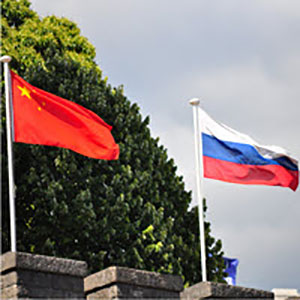How the United States Influences Russia-China Relations
Robert Sutter (George Washington University) identifies both the “drivers” of the Sino-Russian partnership and the “brakes” on a closer relationship and considers the consequences of Sino-Russian Cooperation for the United States.
The partnership between Russia and China has broadened and matured since the end of the Cold War, particularly in the last decade. Leading U.S. experts are in broad agreement that Sino-Russian cooperation increasingly undermines U.S. interests. [1] Thus, past views of the relationship as an “axis of convenience” with little significance for the United States no longer hold.
There are “drivers” and “brakes” to cooperation between Russia and China, and currently the driving forces outweigh the circumstances that could limit close ties. While traditional U.S. strategies to deter coordination may prove ineffectual, we should not view the United States as a constant in these calculations. Rather, U.S. policy and behavior are major uncertain variables that have impacts on the Russia-China relationship. Strengthening the United States’ economic, diplomatic, and military capabilities is essential for changing the prevailing international balance of power in ways that improve the U.S. position.
The Drivers of the Sino-Russian Partnership
Geopolitics and security. Russia’s and China’s interests converge most prominently on their mutual desire to serve as a counterweight to perceived U.S. preponderant influence. Both countries seek greater dominance in their respective regions and perceive the United States as encroaching on areas of strategic interest. Targets here include U.S. missile defense systems, military reconnaissance along the Russian and Chinese borders, and long-range strike capabilities. Vladimir Putin and Xi Jinping share a negative view of the intentions of the United States and its allies that reinforces Sino-Russian cooperation against perceived outside threats. This view colors how both leaders perceive global affairs and the international order. Security collaboration includes arms sales, defense dialogues, and joint exercises. These activities influence third countries and seek to change the balance of power to the disadvantage of the United States.
Ideology. The governments in Moscow and Beijing feel vulnerable and sometimes threatened in the face of Washington’s promotion of human rights and democracy, motivating closer cooperation in response. Both states support a doctrine of noninterference in the internal affairs of other countries, a doctrine that has been threatened by past U.S. involvement in foreign nations. China and Russia, for example, have criticized or blocked Western activity in Afghanistan, Syria, and Libya on the grounds that foreign intervention to address domestic human rights abuses is a violation of sovereignty. [2]
Energy. Russia and China have also used their differing energy positions as a point of collaboration. China seeks to diversify its energy imports beyond the Middle East, while Russia has looked for ways to mitigate Western sanctions on the sale of its vast oil and gas reserves. Developments in energy cooperation include a 2014 agreement between Russia’s Gazprom and the China National Petroleum Corporation on a 30-year deal to utilize the Power of Siberia pipeline to export Russian gas to China. [3]
The Brakes on Closer Sino-Russian Relations
An unequal partnership. Russia increasingly plays the role of a dependent junior partner as it accommodates China’s economic dominance and greater overall influence along Russia’s periphery in Mongolia and Central Asia. These trends jeopardize Russian influence and belie the country’s strong drive for status as an international great power.
Russia has a limited tool kit for exerting international influence. Though the country possesses nuclear weapons, military power, and the means for operations in emerging domains, these tools are constrained by large economic and demographic weaknesses and the absence of compelling soft power. China, meanwhile, wields a growing range of international security, economic, and diplomatic tools.
History. In the 1970s, President Richard Nixon leveraged the Sino-Soviet split to draw Washington closer to Beijing at the expense of Moscow. While today’s circumstances differ greatly, both Moscow and Beijing are still influenced by the history of duplicity and distrust that characterized their often confrontational relationship in the past.
Foreign relations and the international order.Russia and China diverge in their policy approaches to many important countries in the region. Russia has engaged actively in talks sought by Japan to settle their decades-old territorial dispute over the Kuril Islands/Northern Territories, while China maintains a hard line against Japan. [4] Beijing and Moscow are also not always in lockstep on relations with other actors in the region—including North Korea, the Association of Southeast Asian Nations (ASEAN), and India. These differences have led to ambivalence toward one another’s policy goals.
Unlike Russia, China has an enormous stake in, and thus is much more integrated with, the world economy. It favors global stability that supports development. Although Beijing seeks the gradual erosion of the U.S.-led international order, even as China continues to benefit greatly from various aspects of that order, it does not want to be seen as an adversarial revisionist power and formally eschews an alliance with Moscow. In particular, China’s ever-growing interest in the economic penetration of Europe and the Middle East requires stability that is challenged by Russian assertiveness, potentially heightening frictions between the two sides going forward.
The Consequences of Sino-Russian Cooperation for the United States
Today, the drivers of Sino-Russian cooperation are accelerating the bilateral relationship beyond the current capacity of the brakes. This trend poses increasingly serious challenges to the U.S.-supported order in both nations’ respective priority spheres of concern—Russia in Europe and the Middle East, and China in Asia along the country’s rim. The challenges posed by Russia include not only military maneuvers and incursions but also cyber and political warfare that has threatened to undermine elections in the United States and Europe, European unity, and NATO solidarity. Chinese cyberattacks, by contrast, have focused on massive theft of information and intellectual property aimed at accelerating China’s economic competitiveness and thereby enabling it to dominate world markets in key advanced technologies at the expense of U.S. and other international companies.
The two countries work separately and together to complicate and curb U.S. power and influence in the political, economic, and security domains. Joint efforts involve measures in multilateral and bilateral relations with U.S. adversaries such as North Korea, Iran, and Syria, as well as other steps to challenge regional and global norms and institutions backed by the United States.
The Role of U.S. Policy
At the same time that this threat to U.S. interests has been increasing, the influence of past U.S. policy on Sino-Russian cooperation has been low. Current policies have not had a cooling effect on key indicators such as weapon sales, energy-related trade and investment, and cooperation in the United Nations (and elsewhere) against various Western initiatives.
This does not mean that the United States is destined to remain a bystander as the partnership between Russia and China grows stronger. Promising targets for increasing U.S. influence involve exploiting differences between the two sides—the brakes mentioned above. Such differences include China’s rise in power at a time when Russia remains hobbled by demographic and economic weaknesses and Russia’s alienation from the U.S.-led international order at a time when China continues to rely on it. Meanwhile, Russian and Chinese ambitions for dominance in their respective spheres of influence could negatively affect regional governments, making them inclined to work closely with the United States in seeking a strategic counterweight. Possible moves by the Trump administration to ease tension with Moscow could prompt Chinese concerns that Putin might shift Russian policy closer to the United States, negatively affecting Chinese interests.
The strategies that the United States employs need to be realistic and effectively implemented. It is worth emphasizing that these are long-term policy choices requiring sustained whole-of-government approaches that are difficult to carry out amid high-profile distractions. Such options range from efforts to fortify the United States’ international primacy to a strategy of accommodating Russia and/or China; in between these extremes are policies that mix U.S. strengthening and accommodation. Shorter-term policy choices involve the United States, without significant strengthening, seeking to gain an advantage by tilting for or against Russia, China, or both. The path that Washington decides to follow will likely be the most important determinant of the impact of Sino-Russian relations on the United States.
Implications for Congress
One reason Russia-China cooperation against U.S. interests has grown markedly in recent years is their perception of weakness in the United States and its allies. Congressional authorizations and appropriations strengthening U.S. military power would play a direct role in offsetting such calculations of U.S. decline. Meanwhile, congressional support is needed for diplomatic and economic efforts to build U.S. capabilities in these areas while strengthening relations with U.S. allies and partners in opposition to efforts by Moscow and Beijing to erode the Western-backed international economic and political order.
The Trump administration in December laid out a multifaceted National Security Strategy, which is complemented by a National Defense Strategy announced by the Pentagon in January. [5] The documents promise a whole-of-government approach to strengthen the United States and its allies and partners for effective competition with China and Russia in the years ahead. The administration’s initiatives would benefit greatly from congressional interest, changes, and support through oversight and legislation, thereby building national cohesion behind a set of objectives and strategies to preserve U.S. leadership in world affairs.
While think tanks and academics have addressed challenges posed by either Russia or China, few have investigated the implications of the two powers working collaboratively against U.S. interests. Through oversight and requested investigations by congressionally affiliated organizations like the U.S. Government Accountability Office and the U.S.-China Economic and Security Review Commission, or even by noncongressional bodies, Congress could deepen understanding of the implications of Sino-Russian relations for the United States. Crafting effective U.S. policy options requires accurate understanding of the problems. Congress plays an important role in such efforts.
NOTE: This brief is made possible by a grant from the Henry M. Jackson Foundation and draws on the author’s contribution to the roundtable
“The Strategic Implications of Russia-China Relations: Regional Perspectives,” published in the January 2018 issue of Asia Policy.
Endnotes
[1] For more on the findings of these experts, see “Russia-China Relations: Assessing Common Ground and Strategic Fault Lines,” National Bureau of Asian Research (NBR), Special Report, July 2017; and “The Strategic Implications of Russia-China Relations: Regional Perspectives,” Asia Policy 13, no. 1 (2018): 1–45.
[2] See Kenneth Rapoza, “Russia and China Team Up against NATO Libya Campaign,” Forbes, June 17, 2011, https://www.forbes.com/sites/kenrapoza/2011/06/17/russia-and-china-team-up-against-nato-libya-campaign/#19f5892f6ff1; and “Russia Slammed for Vetoing Yet Another Syria Resolution,” Al Jazeera, April 12, 2017, http://www.aljazeera.com/news/2017/04/russia-veto-syria-resolution-170413004627326.html.
[3] “Power of Siberia,” Gazprom, May 18, 2017, http://www.gazprom.com/about/production/projects/pipelines/built/ykv.
[4] Shannon Tiezzi, “Putin to Visit Tokyo as Japan, Russia Restart Peace Talks,” Diplomat, September 30, 2015, https://thediplomat.com/2015/09/putin-to-visit-tokyo-as-japan-russia-restart-peace-talks.
[5] White House, National Security Strategy of the United States of America (Washington, D.C., 2017); and U.S. Department of Defense, “Summary of the 2018 National Defense Strategy of the United States of America: Sharpening the American Military’s Competitive Edge,” January 2018, https://www.defense.gov/Portals/1/Documents/pubs/2018-National-Defense-Strategy-Summary.pdf.
Robert Sutter is Professor of Practice of International Affairs at George Washington University and the principal investigator of the project Strategic Implications of Russia-China Relations at the National Bureau of Asian Research.
Robert Sutter is Professor of Practice of International Affairs at George Washington University and the principal investigator of the project “Strategic Implications of Russia-China Relations” at the National Bureau of Asian Research.



